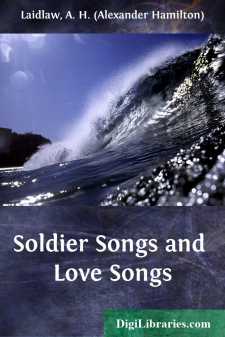Categories
- Antiques & Collectibles 13
- Architecture 36
- Art 48
- Bibles 22
- Biography & Autobiography 813
- Body, Mind & Spirit 142
- Business & Economics 28
- Children's Books 17
- Children's Fiction 14
- Computers 4
- Cooking 94
- Crafts & Hobbies 4
- Drama 346
- Education 46
- Family & Relationships 57
- Fiction 11829
- Games 19
- Gardening 17
- Health & Fitness 34
- History 1377
- House & Home 1
- Humor 147
- Juvenile Fiction 1873
- Juvenile Nonfiction 202
- Language Arts & Disciplines 88
- Law 16
- Literary Collections 686
- Literary Criticism 179
- Mathematics 13
- Medical 41
- Music 40
- Nature 179
- Non-Classifiable 1768
- Performing Arts 7
- Periodicals 1453
- Philosophy 64
- Photography 2
- Poetry 896
- Political Science 203
- Psychology 42
- Reference 154
- Religion 513
- Science 126
- Self-Help 84
- Social Science 81
- Sports & Recreation 34
- Study Aids 3
- Technology & Engineering 59
- Transportation 23
- Travel 463
- True Crime 29
Soldier Songs and Love Songs
Description:
Excerpt
PREFACE.
In issuing this collection of Songs, the author makes the following acknowledgments:—
"The American Ça ira" was suggested while reading the French song of that name, from which song the phrase ça ira alone was appropriated.
In "The Song of William the Conqueror," his characteristic oath, "By the splendor of God!" is used.
In the "Death Song of the Enfants Perdus," a few remembered lines or fragments have been appropriated from an anonymous and almost forgotten English ballad.
"Burke of the Brave Brigade" was written in memory of the late Dennis F. Burke, the last commander of the Irish Brigade in the battle of Gettysburg.
"The Custer Wail" was composed in a dream, in 1877.
In the last two stanzas of "Marshall Ney's Farewell," his own language translated is used in nearly half the lines. The first line of this poem is the expression used by Napoleon, on his voyage to St. Helena, when sighting the shore of France for the last time.
"The Lily Land of France" was suggested by the French song, "Partant pour la Syrie," from which nothing was appropriated but the accentual movement.
Except in the above mentioned instances, the songs here collected were composed without finding a model or a suggestion in any other writer.
The "Soldier Songs" and the "Love Songs" are printed alternately.
A.H. LAIDLAW.
CUSTER.
Foiled on the field with his dead boys around him,All waiting for Earth to recover her own,
Fortune hath missed him, but Glory hath found him,
While fighting a thousand fierce foemen alone.
Custer's the right wing, the left and the center,
Himself is his only reserve and supply.
This is a battle for Spartans to enter,
Where One makes an army to conquer or die.
Straight on his steed doth he meet the grim battle,
The red line of danger grows deadly and large,
Loud from the hills rings the rifleman's rattle,
But Custer is ready, so forward and charge!
Firing with left hand, and fencing with right,
The reins in his teeth, like a handless young Hun,
What is his fate in the terrible fight?
The thousands hath slain him, yet Custer hath won.
His foemen still seek him in terror and wonder,
Alive in the tempest that darkens the vale;
His charge they still fear in the echoing thunder,
His sword in the lightning, his voice in the gale.
The maid for man to love,
All other forms above,
Is she whose home adorns the loam of this fair land of mine:
American in sire,
She's born of love and fire,
And dominates the heart of man as by a right divine.
By rhyming swain pursued,
She meets the puling dude,
Whose hopes to win are centered in his pale Platonic plan;
American in heart,
She spurns his petty part,
Then, speeds him to the army mess to prove himself a man.
With tact burned in the bone,
She stands herself, alone,
The peer of peers of ancient years, for highest functions fit;
American in head
Who woos her, shemaywed,
If he hath grace, and wit, and worth, and sense, and soul and grit.
Alive, alert and sweet,
In rounded poise, complete,
Come any day what will or may, she meets the world at par;
American in soul,
She brooks no man's control,
But brings toonea crystal love as stainless as a star.
Who wins, she weds, retains,
She lives, she loves, she reigns
Through home and hall, and over all the sovereign of the scene;
American in dower,
She knows her native power,
And holds the heart of him she loves, a Woman and a Queen.
THE GOOD SHIP "OHIO."
Swift o'er the lee when the wind flies free,Follows the ship "Ohio,"
With skies o'ercast she bends to the blast,
Like a billowy bird she can fly, O,
And she'll leave all behind in a whispering wind
As soft as a maiden's sigh, O.
Or when o'er the Lakes the storm-cloud breaks,
And the waves scoop their murderous hollow,
While the weaker ship to its mooring must slip
And safe in a harbor wallow,
In the front of the storm she fills her white form,
And the demons of danger follow.
O for the life 'mid the storm and the strife
Of sailor and storm and billow!
Far be my bed from the lubberly dead
That sleep near the wailing willow,
But give me the grave of the mutinous wave
With its heaving and whistling pillow.
Down from the skies look the spectral eyes
Of our kelpie, sprite and bewailer,
And gathering in crowds by the shivering shrouds,
They croon while our cheeks grow paler,
And they sing as they sweep o'er the clamorous deep:
"We love the hot heart of a sailor!"


